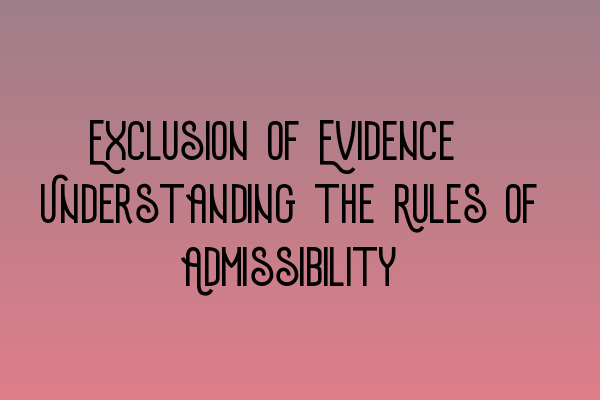Exclusion of Evidence: Understanding the Rules of Admissibility
Welcome to SQE Criminal Law & Practice Law UK. As a leading authority in criminal law, we believe in providing comprehensive and insightful information to help legal professionals and aspiring solicitors navigate the intricacies of the criminal justice system. In this blog post, we will delve into the complex topic of exclusion of evidence and unravel the rules of admissibility.
Before we begin, it’s important to note that understanding the rules of admissibility is crucial for successful criminal practice. As a solicitor, having a thorough knowledge of the evidence that can be presented in court is key to building a strong case and protecting your client’s interests.
The Importance of Admissibility Rules
Admissibility rules serve as a safeguard against the use of unreliable or prejudicial evidence in court proceedings. These rules help maintain the integrity of the legal process by ensuring that only relevant and reliable evidence is considered by the judge and jury.
Understanding these rules is essential for both the prosecution and defense. The prosecution must prove its case beyond a reasonable doubt, while the defense seeks to challenge the evidence presented against their client. Adhering to the rules of admissibility is crucial to ensure a fair trial for all parties involved.
Types of Exclusionary Rules
There are various types of exclusionary rules that can lead to the exclusion of evidence in criminal trials. Let’s explore some of the most common ones:
- Hearsay: Hearsay evidence is an out-of-court statement offered to prove the truth of the matter asserted. In general, hearsay evidence is not admissible, unless it falls within a recognized exception. It’s important to be familiar with the exceptions to hearsay to effectively argue for or against the admission of such evidence.
- Illegally Obtained Evidence: Evidence that has been obtained in violation of a defendant’s constitutional rights, such as evidence obtained through an illegal search and seizure, may be excluded from court proceedings. It’s crucial to understand the legal requirements for searches and seizures to determine whether evidence has been lawfully obtained or not.
- Character Evidence: Evidence that is solely offered to prove the character of a person and their propensity to commit the crime charged is generally not admissible. However, there are exceptions to this rule, such as when character evidence is used to prove motive, opportunity, or intent.
- Expert Opinion Evidence: Expert witnesses play a crucial role in many criminal trials. However, their opinions must be based on reliable scientific or specialized knowledge. If an expert’s opinion does not meet the requirements of admissibility, it may be excluded from trial.
- Privileged Communication: Certain communications, such as those between attorney and client, doctor and patient, or spouses, are protected by privilege and cannot be admitted as evidence in court. Privilege rules are designed to encourage open and honest communication within these relationships.
Exceptions to Exclusionary Rules
While exclusionary rules are designed to protect the fairness and integrity of the legal system, there are exceptions that may allow for the admission of otherwise excluded evidence. It’s essential to be aware of these exceptions and understand when they apply:
- Exclusionary Rule Exceptions: In some circumstances, courts may allow evidence that would normally be excluded under the exclusionary rules. For example, the court may admit evidence if it was discovered through an independent source or if the police acted in good faith.
- Judicial Discretion: In certain cases, a judge may use their discretion to admit evidence that would otherwise be excluded. This typically occurs when the probative value of the evidence outweighs any prejudicial effect.
- Public Interest: In exceptional cases, evidence that would normally be excluded may be admitted in the interest of public safety or national security. This often involves balancing the public interest against the defendant’s rights.
Conclusion
Understanding the rules of admissibility and the exclusion of evidence is essential for criminal law practitioners. By being familiar with these rules, solicitors can effectively navigate the complexities of the criminal justice system and build strong cases on behalf of their clients.
We hope this blog post has provided you with valuable insights into this complex topic. If you’re interested in expanding your expertise in criminal practice, consider attending our workshops and seminars on criminal practice. Staying informed and prepared with regular updates in UK criminal laws is also crucial, which you can find in our article on updates in UK criminal laws. Additionally, for those preparing for the SQE Criminal Practice exam, our mock tests can provide valuable exam simulation for success.
At SQE Criminal Law & Practice Law UK, we are committed to enhancing your SQE criminal law study group experience. For further insights on decoding criminal evidence rules, we recommend reading our article on decoding criminal evidence rules.
Thank you for reading, and we look forward to helping you deepen your understanding of criminal law and practice.
